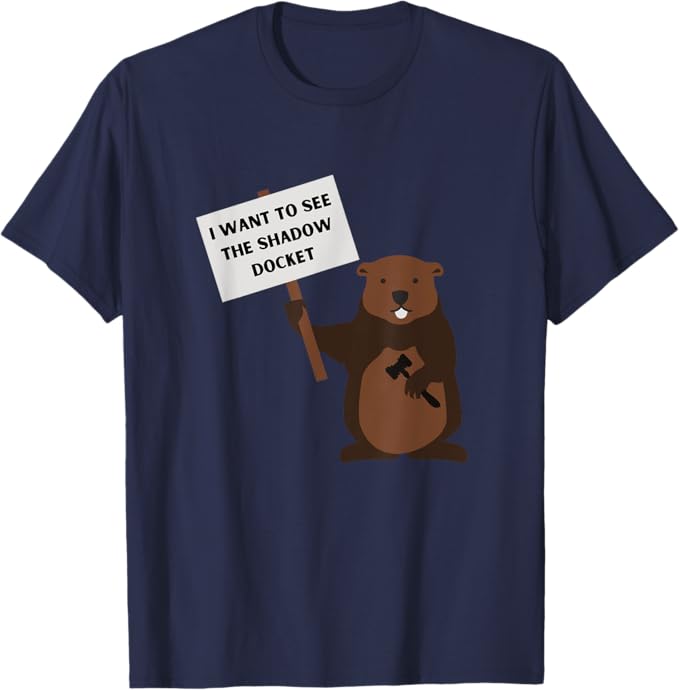UPDATED
FOR
2024!!!
It’s
the
holiday
season
and
time
yet
again
to
buy
gifts
for
the
lawyers
(or
law
students)
in
your
lives.
And
while
you
might
be
tempted
to
go
with
a
lump
of
coal,
let’s
give
the
attorneys
the
benefit
of
the
doubt
and
make
sure
they’re
treated
right
this
season.
Below
we’ve
gathered
gift
ideas
into
some
broad
categories
that
lawyers
might
enjoy.
You
can
either
peruse
the
whole
post
or
click
on
the
link
below
to
jump
directly
to
the
category
that
you
think
best
suits
your
shopping
mission:
Books
Electronics
Apparel
&
Accessories
Games
Food
&
Drink
Desk
Toys
&
Office
Decor
Luggage
(Disclosure:
When
available,
we
have
used
affiliate
links.)
Books
Do
you
have
a
reader
on
your
hands?
Of
course
you
do,
you’re
buying
for
an
attorney!
Grab
a
nice
book
to
curl
up
with
this
holiday
season
—
or
to
read
on
their
next
flight
to
some
far-flung
deposition.
The
Originalism
Trap
by
Madiba
K.
Dennie
of
Balls
and
Strikes
explores
the
dubious
value
of
“originalism”
as
a
judicial
philosophy
and
outlines
a
path
for
constitutional
interpretation
more
faithful
to
the
Reconstruction
amendments.
Kathryn
Rubino
spoke
with
the
author
here.
Murder
the
Truth
is
another
banger
from
David
Enrich,
author
of
the
earlier
Servants
of
the
Damned
detailing
the
Biglaw
institutions
fueling
the
Trump
movement.
This
time,
the
New
York
Times
editor
digs
into
the
conservative
legal
movement’s
mounting
assault
on
New
York
Times
v.
Sullivan.
Speaking
of
speech,
Mary
Anne
Franks
produced
Fearless
Speech
(featured
in
a
podcast
here)
highlighting
the
First
Amendment’s
flawed
framework
for
promoting
a
free
and
fair
democracy.
Before
the
Movement
takes
a
scholarly
look
at
the
overlooked
history
of
legal
efforts
to
deliver
Black
civil
rights
that
predate
the
mid-20th
century
(conversation
with
the
author
here).
On
the
fiction
side,
Devil’s
Defense
(chat
with
author
here)
focuses
on
a
small-town
lawyer
forced
to
represent
a
client
she
can’t
stand.
Meanwhile
Just
One
Look
is
a
thriller
set
during
a
document
review.
If
you’re
buying
for
an
ATL
fan,
several
of
our
columnists
have
books
too.
Your
Debt-Free
JD
by
Jonathan
Wolf
guides
prospective
law
students
through
the
process
of
getting
a
degree
that
doesn’t
break
the
bank
while
D.W.
Randolph’s
Big
Law
Confidential
delves
into
what
it’s
really
like
to
work
in
Biglaw
for
those
already
weighing
their
career
path.
Tahmina
Watson’s
The
Startup
Visa
probably
isn’t
a
gift
(or
maybe
it
is…
who
am
I
to
judge
the
level
of
sentimentality
in
your
gift-giving
relationship)
but
it’s
a
great
resource
for
immigration
law.
And,
of
course,
we
still
recommend
Allow
Me
to
Retort:
A
Black
Guy’s
Guide
to
the
Constitution,
by
former
Above
the
Law
Executive
Editor
Elie
Mystal.
electronics
 With
With
the
legal
industry
slowly
returning
to
the
road,
this
is
an
amazing
gift
for
any
traveling
attorney.
It’s
a
portable
monitor
extension,
giving
them
the
multiple
monitor
lifestyle
from
their
laptop.
You
can
find
a
number
of
models
based
on
the
size
of
the
laptop
involved.
Speaking
of
travel,
these
are
only
a
couple
of
many
options,
but
consider
giving
the
gift
of
noise-cancelling
earbuds
or
headphones.
Or
you
can
get
some
Airpods
without
the
cool
firm
branding.
At
a
much,
much,
much
higher
price
point,
nothing
keeps
their
work
more
confidential
while
traveling
than
an
Apple
Vision
Pro.
If
they’re
working
off
of
a
Mac
the
device
can
seamlessly
mirror
that
screen
into
the
visor
to
prevent
nosy
neighbors
from
seeing
anything.
The
legal
profession
has
already
cut
a
lot
of
paper
out
of
its
workflow,
but
there
are
several
tools
out
there
to
move
notes
to
the
digital
world
ranging
from
the
eminently
affordable
Rocketbook
to
the
fully
featured
ReMarkable2.
Have
you
considered
how
many
devices
attorneys
need?
If
you
have,
then
you
might
imagine
the
home
office
is
a
tangle
of
power
cords
befitting
an
Aliens
set.
This
can
help
with
a
whopping
ELEVEN
OUTLETS.
Or
maybe
they
don’t
need
outlets
at
all
with
a
wireless
charging
mouse
pad.
And
if
they
lose
those
devices,
consider
some
Airtags,
the
tracking
devices
that
make
sure
nothing
important
is
ever
lost
like
keys
or
briefcases
full
of
sensitive
client
documents.
We
also
still
love
the
Ember
Mug
allows
the
user
to
set
the
ideal
temperature
for
their
coffee
or
tea
—
and
then
keeps
it
there.
apparel
&
accessories

ESK
Esq.
has
a
whole
line
of
apparel
for
the
lawyer
out
there
including
a
stylized
view
of
glorious
Blackacre
of
Property
Law
fame
and
an
International
Shoe
logo
for
Civ
Pro
nerds.
But
for
a
shirt
that
would
impress
Professor
Steve
Vladeck,
they’ve
got
a
groundhog
hoping
to
see
the
Court’s
shadow.
If
you’re
buying
for
a
law
student
this
season,
consider
this
shirt
featuring
the
refrain
of
law
students
everywhere.
The
“ugly
sweater
party”
phenomenon
isn’t
exactly
my
cup
of
tea,
but
if
you
know
a
lawyer
who
enjoys
them,
this
“Allegedly”
themed
sweater
is
pretty
amazing.
It
sure
beats
putting
“allegedly”
on
some
other
articles
of
clothing.
There’s
also
a
“Fa
Law
Law
Law
Law”
What
about
a
foul-mouthed
lawyer?
We’ve
got
that
covered
too.
Here’s
a
shirt
for
every
good
Sunny
fan
who
knows
the
benefit
of
a
solid
education
in
Bird
Law.
If
your
lawyer
is
cruising
for
a
disciplinary
referral,
there’s
always
this
WWSD
shirt.
Here’s
a
Vincent
Gambini
shirt
too.
There’s
also
this
cute
Attorneys
Assemble
shirt
(available
on
mugs
and
posters
too).
Here’s
a
Ruth
Bader
Ginsburg
necklace
if
you’re
buying
for
someone
who
just
doesn’t
quit.
Games
First
Monday
in
October
from
Fort
Circle
games
“allows
1-4
players
to
experience
the
history
of
the
Supreme
Court
of
the
United
States
from
1789
through
2009
in
two
hours
of
gameplay.”
The
game
will
not
ship
until
2025,
but
if
you’re
getting
it
this
holiday
season,
the
developers
offer
a
“printed Writ
of
Habeas
Ludum”
that
you
can
deliver
in
the
meantime.
While
on
the
subject
of
Fort
Circle,
they
also
have
a
game
covering
the
suffrage
movement
called
Votes
for
Women
that
you
can
get
now.
It’s
not
so
much
a
“game”
but
the
Magnetic
Poetry
set
lawyer
edition.
I
Dissent and
Capital
Punishment
fall
within
the
“Cards
Against
Humanity”
style
party
game
genre
but
with
a
legal
twist.
FOOD
&
DRINK
 Returning
Returning
to
the
office
means
returning
to
the
kitchen
or
cafeteria
stocked
with
goodies.
But
in
the
hybrid
working
world,
lawyers
still
have
to
handle
their
own
snacks
some
days.
So
how
about
a
super
mini-fridge
to
keep
the
home
office
stocked.
It’s
portable
and
plugs
in
to
keep
things
cool
(or
warm).
It’s
not
much
bigger
than
a
lunchbox,
but
it
can
keep
them
covered
for
the
day.
What
better
way
to
get
into
the
holiday
spirit
than
to
enjoy
some
holiday
spirits?
Caskers,
founded
by
Harvard
Law
grads,
curates
all
varieties
of
the
best
craft
spirits
from
around
the
world
and
offers
big
discounts.
 Is
Is
a
lawyer
having
a
good
day
or
a
bad
day?
This
wine
glass
will
let
everyone
know.
Meanwhile
this
wine
glass
explains
why
the
lawyer
is
drinking
today.
Desk
Toys
&
Office
Decor
Bring
some
life
to
that
office
that
your
favorite
lawyers
have
now
returned
to.
These
candles
from
Anecdote
Candles
make
for
nice
office
gifts.
There
are
a
few
options
like
the
“Two
Weeks
Notice
—
Smells
like
burn
out
and
peace
out.”
LuckyCactus
offers
the
intriguing
“Smells
Like
A
MF’ing
Attorney
In
This
Bitch,”
which
I’m
almost
terrified
to
smell.
Another
candle
option
available
through
Amazon
is
a
bit
more
celebratory
of
lawyering.
Help
the
lawyer
you
love
sit
in
style.
Consider
this
modern
ergonomic
office
chair
look
or
this
super
old
school
leather
lawyer
chair
look.
Or
it
they’re
a
partner
just
get
the
Herman
Miller.
I’ve
sat
in
these
a
bunch
and
it’s
like
you’re
sending
a
love
note
to
your
ass.
Lawyers
aren’t
like
other
professions,
so
why
are
we
using
the
same
keyboard
as
other
professions?
LegalType
has
a
lawyer-specific
mechanical
keyboards
and
key
caps
available.
If
they
need
a
home
desk
—
which
most
lawyers
probably
have
by
now,
but
law
grads
starting
new
jobs
in
2025
might
not
—
this
is
a
nice
entry-level
home
option
that
gets
the
job
done
without
overwhelming
the
studio
apartment.
Though
nicer
options
are
available.
And
then
there
are
Funko
Pops.
You
know,
those
big
head
toys
that
seem
to
be
everywhere
these
days.
They
even
make
Golden
Girls
Funko
Pops
now,
which
seems
like
the
border
of
market
saturation.
This
Matt
Murdock
one
is
a
legit
collectors
item
at
this
point.
There’s
a
Citadel-dwelling
Lawyer
Morty
from
Rick
and
Morty. For
that
matter,
Abraham
Lincoln
was
a
lawyer.
Someone
at
CafePress
has
a
billable
hours
clock
available
to
mix
decor
with
some
wit.
Luggage
The
essential
gift
for
a
traveling
lawyer!
The
ScanFast
Briefcase
from
Mobile
Edge
is
a
TSA-compliant
laptop
bag
that
allows
the
traveler
to
keep
their
laptop
inside
their
bag
while
passing
through
TSA
security
checkpoints.
This
makes
traveling
with
a
laptop
simple
while
keeping
the
laptop
secure.

For
a
less
standard
design,
check
out
this
option
(which
also
comes
in
three
other
color
combinations).
The
bag
is
still
TSA-compliant
and
boasts
rich
pink
suede
and
brown
faux-leather
exterior
highlighted
by
a
bright
color-accented
satin
lining.
A
matching
shoulder
strap,
separate
zippered
workstation
for
files,
and
a
trolley
strap
for
rolling
luggage
included.
Carries
a
Lifetime
Warranty!
If
you
come
across
any
more
cool
holiday
gift
ideas
for
attorneys,
send
them
our
way!
We’re
always
looking
to
add
more
to
the
annual
guide.
 Joe
Joe
Patrice is
a
senior
editor
at
Above
the
Law
and
co-host
of
Thinking
Like
A
Lawyer.
Feel
free
to email
any
tips,
questions,
or
comments.
Follow
him
on Twitter if
you’re
interested
in
law,
politics,
and
a
healthy
dose
of
college
sports
news.
Joe
also
serves
as
a
Managing
Director
at
RPN
Executive
Search.










